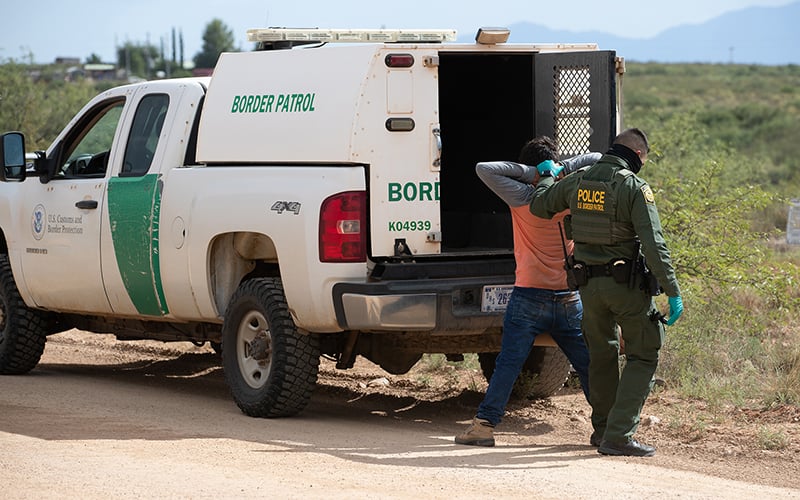WASHINGTON – The House passed a pair of bills Thursday that would provide a path to citizenship for Dreamers and legal status to undocumented farmworkers, potentially affecting millions in the U.S. and tens of thousands in Arizona.
Republican critics derided the measures as little more than amnesty for people who came to this country illegally, and said they will create more problems than they solve. But supporters hailed the votes as a “huge step in the right direction” for law-abiding, productive residents who just happen to be undocumented.
The Dream and Promise Act of 2021 would give permanent legal residency and a path to citizenship for Dreamers – undocumented immigrants who were brought here as children. It passed 228-197, with all Democrats and nine Republicans voting for it.
The Farm Workforce Modernization Act would let any undocumented farmworker apply for a renewable, temporary legal status as a “certified agricultural worker.” Those who have spent several years working in the country would be able to apply for a green card – or permanent legal residency status.
The farm workforce bill, which had the backing of farm and business groups because it streamlines the visa process for farmworkers, passed by a comfortable 247-174, with support from 30 Republicans.
Both bills now head to the Senate, where their fate is less certain.
But backers like Rep. Greg Stanton, D-Phoenix, said the undocumented residents the bills target are “contributing greatly to our economy” and deserve the chance to come out of the shadows.
“They make sure our grocery stores’ shelves are stocked and our families are fed, they work long shifts in COVID hospital wings and now we’re vaccinating our communities,” said Rep. Greg Stanton, D-Phoenix, of the Dreamers who would be affected by the bill.
“They are giving back and contributing an estimated $240 million in taxes yearly in Arizona alone,” he said on the House floor.
House Majority Leader Steny Hoyer, D-Md., said the bill is aimed at “patriotic and law-abiding residents” who deserve the “chance to live without fear of deportation or family separation.”
But critics like Rep. Andy Biggs, R-Gilbert, pointed to a recent surge in migrants at the southern border, saying of the Dreamer bill that it was “irresponsible to be considering this bill today.” Biggs charged that the bill would just make the situation at the border worse.
“This bill provides amnesty to millions of those people who are illegally in this country,” Biggs said. “This promise of amnesty is a magnet for aliens attempting to enter the United States today.”
The bill would grant conditional permanent resident status for 10 years to undocumented residents who were children when they were brought to the U.S. and may know no other country, the so-called Dreamers.
In order to be eligible under the bill, residents would have to have a clean criminal record, be in school or have graduated, have a job or have served in the military. They would also have to pass a background check, pay a fee and register for Selective Service.
Once qualified, they would be protected from deportation and would be able to apply for permanent legal status. In addition to Dreamers, the bill would apply to people on Temporary Protected Status – who are allowed to stay here because they cannot return to their home countries – and to undocumented immigrants with Deferred Enforcement Departure orders.
It is unclear how many people would qualify as Dreamers under the bill, but the criteria are similar to those for the Deferred Action for Childhood Arrivals program. And DACA numbers are easy to measure: U.S. Citizenship and Immigration Services had issued DACA protection to 640,760 people as of September, 23,960 of whom were in Arizona.
The Migration Policy Institute has estimated that another 1.3 million people in the U.S. may currently be DACA-eligible, and 47,000 in Arizona could meet the criteria for DACA.
Despite similarities between the two programs, DACA is not a law but an administrative program, making it vulnerable to being killed, something then-President Donald Trump tried unsuccessfully to do in 2017. DACA remains popular with most voters, and a Pew Research survey in 2020 found that 74% of Americans support the idea of legal status for Dreamers.
The farmworker bill would also require a background check and a fine for those people who wanted to apply for permanent legal residency. It also streamlines the process for getting H-2A visas, for foreign agricultural workers, and includes wage and housing protections for workers.
Reyna Montoya, founder and CEO of the advocacy group Aliento, called passage of the Dreamer bill a “huge step in the right direction,” but is holding her breath for the battle in the Senate. She expressed disappointment in lawmakers who voted against the bill, saying the law has the chance to provide certainty to the lives of thousands of Dreamers.
“I really hope that they would touch their hearts and would see us as human beings because I would never wish that any human being would have to endure the uncertainty and the pain that we go through,” said Montoya, who is a DACA recipient herself.
“We’re not talking about tools, we’re not talking about cattle, we’re talking about … human lives,” she said.



